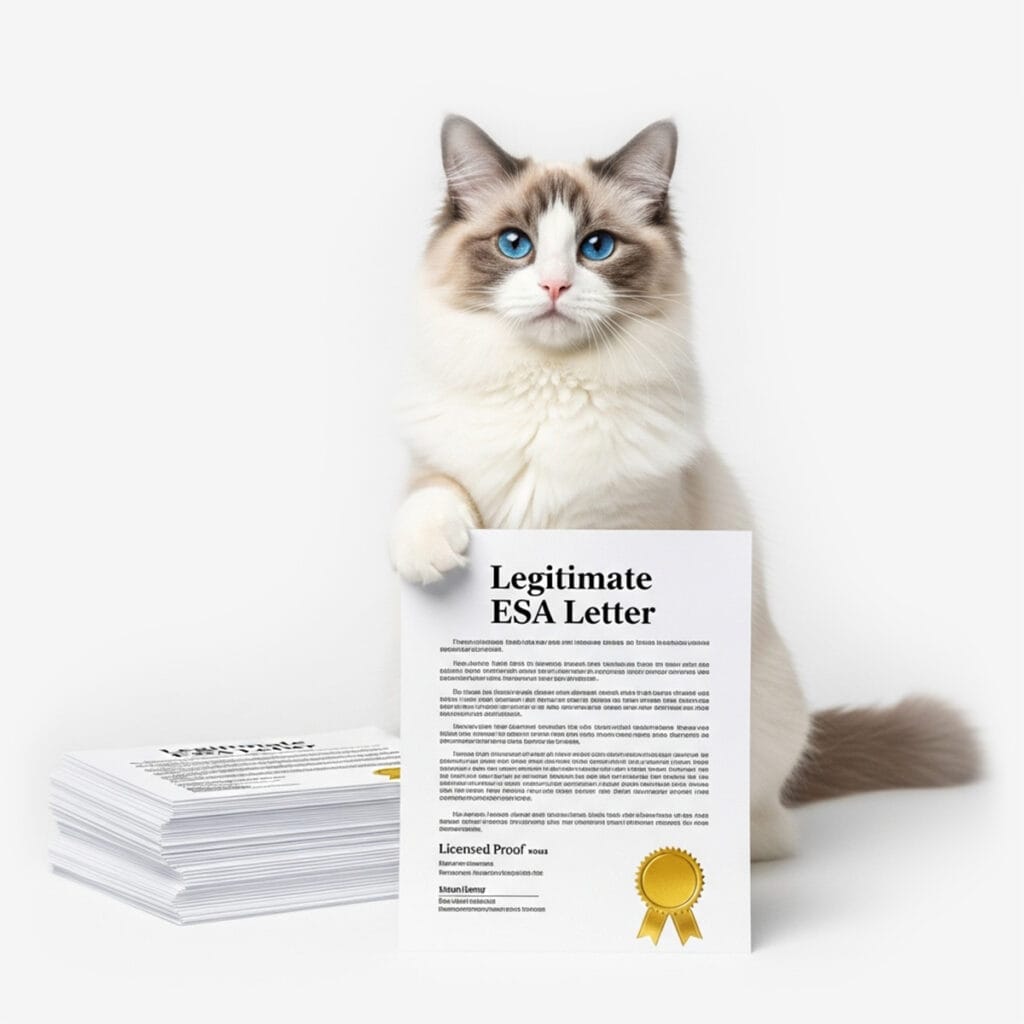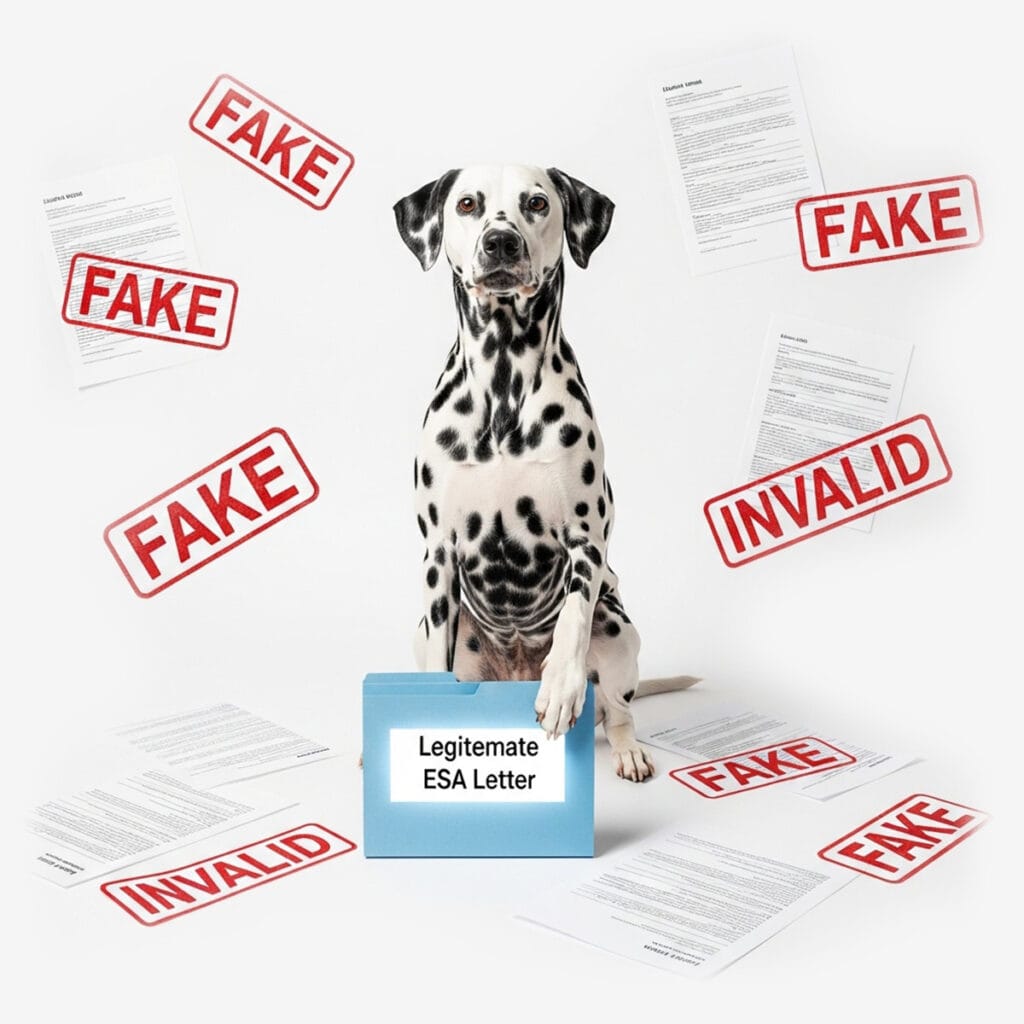If you’re reading this, chances are you’re facing one of the most stressful situations a pet owner can encounter: a landlord who is pushing back on your emotional support animal. After helping thousands of individuals navigate these scenarios nationwide, one thing is clear — you are not alone, and you do have rights that many housing providers either misunderstand or overlook.
For those seeking a direct answer: yes, a landlord can deny an Emotional Support Animal (ESA) — but only in very specific and limited circumstances. These situations typically involve improper documentation, an undue financial or administrative burden, or documented health or safety concerns related to the specific animal.
In practice, ESA approvals are far more common than denials. When denials do occur, they are often tied to misunderstandings of federal housing requirements or improper documentation. When tenants understand their rights and submit compliant ESA documentation, many housing providers reconsider and approve the accommodation.
Legal Framework for ESAs in Rental Housing
Overview of the Fair Housing Act (FHA)
The Fair Housing Act (FHA) is the primary federal law governing Emotional Support Animals in housing. Enacted in 1968 and expanded in 1988, the FHA prohibits housing discrimination and requires housing providers to consider reasonable accommodation requests related to mental or emotional health needs.
Under the FHA, emotional support animals are classified as assistance animals, not pets. This distinction means housing providers must evaluate ESA requests differently from standard pet requests and may be required to allow ESAs in housing that otherwise prohibits pets. The law applies to most rental situations, including apartments, condominiums, campus housing, and many single-family homes.
State-Specific Laws and Regulations
While the FHA establishes nationwide protections, some states impose additional requirements or clarifications. States such as California, Florida, Texas, and Washington require ESA documentation to be issued by a healthcare provider who is licensed in the same state as the tenant. Because state rules continue to evolve, ESA evaluations should always be conducted by a properly licensed provider authorized to practice in the tenant’s state.
In recent years, several states—including California under AB 468, as well as Montana, Arkansas, Iowa, and Louisiana—have increased scrutiny of ESA documentation. In these jurisdictions, housing providers may reasonably expect evidence of an established clinical relationship, rather than a single, one-time interaction. While specific requirements vary by state, this often involves an initial evaluation followed by a follow-up interaction over a period of time (commonly around 30 days), rather than same-day documentation. This approach helps demonstrate that the provider has sufficient familiarity with the individual’s mental or emotional health needs, strengthening the credibility of the accommodation request and reducing the risk of challenges related to inadequate documentation.

What Rights Do Tenants with an ESA Have?
Tenants with a legitimate Emotional Support Animal have several important protections under the FHA, including the right to:
- Live with an ESA in housing that normally restricts pets
- Request a reasonable accommodation without retaliation
- Be exempt from pet fees, pet rent, and pet deposits
Housing providers must engage in an interactive process when reviewing accommodation requests and may not impose additional conditions beyond what the law allows. Tenants are also protected with respect to privacy: housing providers may not request medical records, a specific diagnosis, or detailed information about an individual’s mental or emotional health condition. They may only request documentation from a licensed healthcare provider confirming a qualifying need for an Emotional Support Animal.
Landlord Obligations and Tenant Rights
Legitimate ESA Letters
A legitimate ESA letter must be issued by a licensed healthcare provider authorized to practice in the tenant’s state. This may include psychologists, psychiatrists, therapists, licensed clinical social workers, or other qualified professionals.
Valid ESA letters are typically written on official letterhead, include licensing information, and are current (generally issued within the past year). These elements allow housing providers to verify the documentation efficiently.
Reasonable Accommodations Landlords Must Provide
When proper documentation is submitted, landlords are required to offer reasonable accommodations. This generally includes allowing an ESA in no-pet housing, waiving pet fees, pet rent, and pet deposits, and avoiding restrictions based solely on breed, size, or weight.

Can Landlords Charge Fees for ESAs?
No. Under the FHA, housing providers cannot charge pet-related fees for Emotional Support Animals. These charges apply to pets—not assistance animals. Tenants remain responsible for any actual damage caused by their animal, but landlords may not impose separate pet deposits or recurring pet rent simply because an ESA is present.
Multiple Emotional Support Animals
Multiple Emotional Support Animals may be permitted when clinically appropriate. Federal housing guidance allows more than one ESA if each animal serves a distinct, disability-related need and the request remains reasonable based on the individual circumstances.
Responsibilities of Tenants with ESAs
Having an ESA comes with responsibilities. Tenants remain liable for any actual damage caused by their animal and must ensure the animal does not pose a threat or create ongoing disturbances. Responsible ownership helps preserve housing stability and supports successful accommodations.
Scenarios Where Landlords Can Deny ESAs
Illegitimate ESA Documentation
One of the most common reasons for denial is insufficient documentation. HUD guidance explicitly states that certificates, ID cards, registries, or instant letters issued without a legitimate clinical evaluation are insufficient for housing purposes. Valid ESA documentation must meet federal housing standards.
Letters that lack provider credentials, appear mass-produced, or are issued without an individualized assessment are frequently rejected during verification. To reduce this risk, documentation should come from a licensed healthcare provider who has conducted a proper evaluation and is authorized to practice in the tenant’s state. At Official Pets, we help individuals connect with independent, state-licensed mental health professionals who follow current federal and state documentation standards and issue ESA letters only when clinically appropriate. This approach helps tenants avoid delays, denials, and challenges associated with inadequate or unverifiable paperwork.
Undue Financial or Administrative Burden
A landlord may deny an ESA request only if granting the accommodation would impose a significant financial or administrative burden. For example, an accommodation might be considered unreasonable if the animal is physically incompatible with the dwelling (such as a large animal in an extremely small unit) or if allowing the animal would cause the landlord’s insurance coverage to be cancelled. Minor inconvenience or speculative costs do not meet this standard.
ESA Posing a Direct Threat to Others
A landlord may deny an ESA only if the specific animal poses a direct threat to the health or safety of others and that threat cannot be mitigated. This determination must be based on objective evidence of the individual animal’s behavior — not assumptions, generalized fears, or breed stereotypes.

When to Submit an ESA Letter
A tenant may request a reasonable accommodation for an emotional support animal at any time, including after moving in or during an active tenancy. There is no requirement that an ESA letter be submitted before signing a lease. However, HUD guidance encourages providing documentation as early as possible to allow housing providers sufficient time to engage in the interactive process and evaluate the request. Submitting documentation promptly can help prevent delays, misunderstandings, or unnecessary disputes once an accommodation is requested.
What to Do If an ESA Request is Rejected
If a housing provider denies your emotional support animal accommodation request, begin by reviewing the reason provided. Many denials result from misunderstandings of the Fair Housing Act (FHA) or from incomplete or unclear documentation that can be corrected. When the reason for denial appears questionable, it is often effective to respond in writing. Clearly restate your reasonable accommodation request under the FHA and provide any additional information the housing provider is legally permitted to request. Keeping communication professional and documented helps clarify the issue and creates a record of your good-faith effort.
If the denial continues, it is important to document everything. Keep copies of emails, written notices, forms, and any responses you receive. If conversations occur by phone or in person, take dated notes summarizing what was discussed. Maintaining a clear paper trail is especially valuable if the situation escalates. In many cases, unresolved disputes can be addressed by contacting a local fair housing agency or filing a complaint with the U.S. Department of Housing and Urban Development (HUD). These steps often lead to resolution without the need for legal action.
Key Takeaways
Landlords cannot deny an Emotional Support Animal simply because of a no-pet policy, breed restrictions, or personal preference. Under the Fair Housing Act (FHA), emotional support animals are classified as assistance animals, not pets, and housing providers must consider reasonable accommodation requests when supported by proper documentation.
That said, landlords may deny an ESA request in limited, legally defined circumstances, such as when the documentation is insufficient or unverifiable, when the accommodation would impose a significant financial or administrative burden, or when a specific animal poses a direct threat to health or safety that cannot be reasonably mitigated. General assumptions, breed stereotypes, or speculative concerns are not valid reasons for denial.
Tenants have important privacy protections. Housing providers may not request medical records, a diagnosis, or detailed personal health information. They may only verify that an ESA letter was issued by a licensed healthcare provider who is authorized to practice in the tenant’s state and who conducted an appropriate clinical evaluation.
Proper documentation is critical. ESA letters that lack provider credentials, appear mass-produced, or are issued without an individualized assessment are commonly rejected. In some states, housing providers may also expect evidence of an established clinical relationship rather than same-day documentation, making provider licensing and evaluation practices especially important.
With accurate information, compliant documentation, and a clear understanding of tenant rights, most ESA accommodation requests are approved. When tenants approach the process professionally and responsibly, unnecessary delays, denials, and housing conflicts are far less likely.
How Official Pets Supports the ESA Process
Official Pets focuses on education, transparency, and access to qualified professionals. We help individuals connect with independent, state-licensed healthcare providers who determine whether an Emotional Support Animal is clinically appropriate and, when warranted, issue compliant documentation. Our role is to support clarity, compliance, and confidence so individuals can better understand their options and navigate the ESA housing process under federal and state law.

